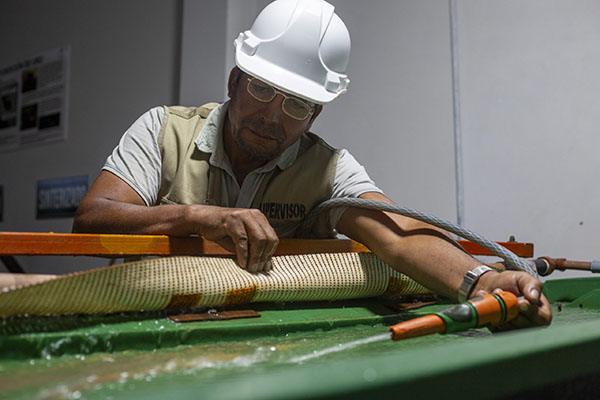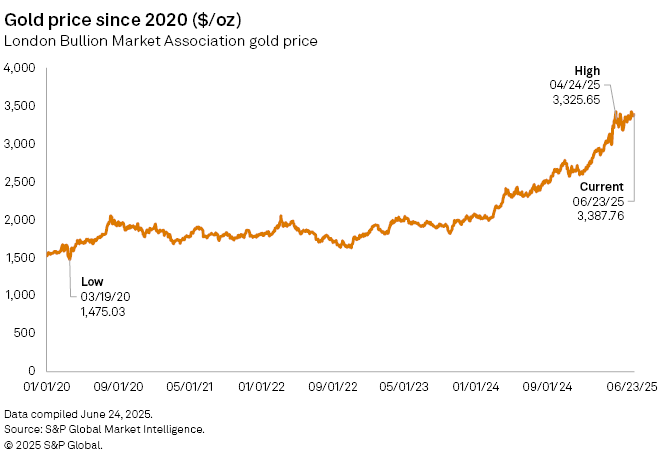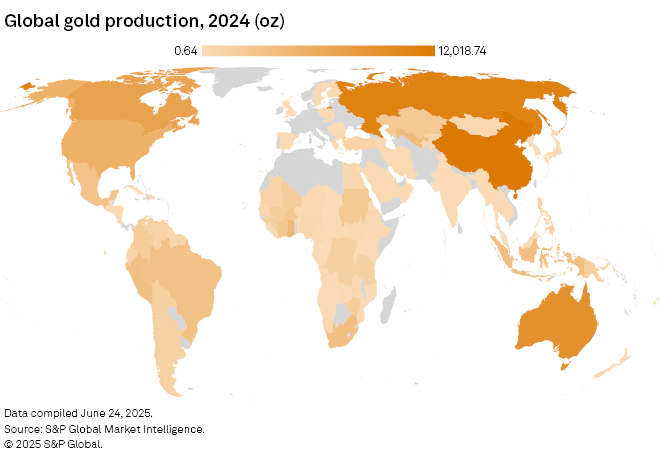Featured Topics
Featured Products
Events
S&P Global Offerings
Featured Topics
Featured Products
Events
S&P Global Offerings
Featured Topics
Featured Products
Events
S&P Global Offerings
Featured Topics
Featured Products
Events
Financial and Market intelligence
Fundamental & Alternative Datasets
Government & Defense
Professional Services
Banking & Capital Markets
Economy & Finance
Energy Transition & Sustainability
Technology & Innovation
Podcasts & Newsletters
Financial and Market intelligence
Fundamental & Alternative Datasets
Government & Defense
Professional Services
Banking & Capital Markets
Economy & Finance
Energy Transition & Sustainability
Technology & Innovation
Podcasts & Newsletters
30 Jun, 2025

| A miner at a legal processing plant in Madre de Dios in Peru uses a gravimetric table, a tool that eliminates the need for mercury in the extraction process. Pure Earth is one of many organizations that say giving small miners access to safer and legal means of mining can help avoid some of the negative impacts associated with artisanal and small-scale gold mining activity. Source: Pure Earth. |
Soaring gold prices are raising the incentive for illegal gold mining, which fuels social conflict, degrades the environment and harms legal miners, industry participants and analysts told Platts, part of S&P Global Commodity Insights.
Not all artisanal and small-scale gold mining (ASGM) is illegal, but such operations are a frequent and lucrative target for organized crime and corruption across many regions. With gold holding well above $3,000/oz,
"It's more a catalyst rather than the cause," Dominic Raab, a former British deputy prime minister and current head of global affairs for Appian Capital Advisory LLP, told Platts. "But of course, if the price goes up and particularly as the cost of smuggling cocaine has gone up because of the war on drugs, criminal organizations have looked at diversifying into gold. It's easy to melt down. It's easy to smuggle. It's pretty tough to track."
Price incentivizing gold activity across the board
The London Bullion Market Association's gold price closed at $3,325.64/oz on June 25, up 72.8% from just two years ago. The price of gold has skyrocketed for several reasons, including demand from investors seeking a safe haven from market volatility and geopolitical uncertainty.

Just as the higher gold price has large-scale miners tapping into previously uneconomic resources, higher prices are "absolutely" drawing in more small-scale mining as well, said Terry Heymann, CFO of the World Gold Council, in an interview with Platts. Many are even leaving behind other industries to tap into small-scale gold's increasingly profitable opportunities, Heymann said.
"Ghana is a case in point; people are swapping out from farming," Heymann said. "For example, cocoa farming. You might be aware that cocoa prices are going up. One of the reasons ... is people are switching out of farming cocoa and moving into artisanal mining."
Gold in the shadow economy
Artisanal and small-scale mining, which largely takes place in a "shadow economy" outside of traditional legal frameworks, occurs in about 80 countries but is particularly concentrated in Africa, Asia and Latin America. While margins on gold sales are rising around the world, "the reality for those involved in ASGM is rarely prosperity," wrote Helen Clark, chair of the board of the Extractive Industries Transparency Initiative, in a 2024 report partnering with the World Gold Council. The sector, she added, is "more likely to be associated with environmental degradation, the use of mercury, child labor, and poor safety controls."
Gold's ties to illegal activity vary widely around the world as selling the metal becomes increasingly profitable. In July 2024, the US issued a statement of concern about the role that certain minerals from Rwanda and the Democratic Republic of the Congo, including gold, play in financing global conflict.
In Africa, mercenaries including the Wagner Group, a Russian state-funded private military group, are in part fueled by gold mining activities. Both sides of the conflict in Sudan are fighting over considerable gold resources being smuggled out of the country each year, and Latin American organized crime is diversifying from cocaine to gold sales.
"The Wagner Group's money, something like $2.5 billion since the invasion of Ukraine, is going back through Moscow and back into the Russian war machine," Raab said. "It's fueling and expanding the business models of the drug cartels — and the Islamic State is getting back in the business of terrorism, and it's using its ability to extort gold as a means to do so. The costs [of trying to fix these issues] are all much, much lower than ignoring the problem."
Environmental devastation
ASGM can also be environmentally devastating. While the annual rate of mining deforestation in the Amazon appears to have peaked around 2022, the cumulative mining deforestation footprint continues to grow, said Matt Finer, senior research specialist with the Amazon Conservation Association and director of the Monitoring of the Andean Amazon Project (MAAP). Around one-third of the total mining-related deforestation that MAAP tracks using satellite-based, real-time monitoring comes from illegal mining activity, Finer added.
While roads and agriculture often dominate the story of the deforestation of the Amazon, illegal mines are "penetrating deeper into primary forests, including protected areas and Indigenous territories," Finer added.
"Gold mining in the Amazon is certain to stay a major issue in the coming years as gold prices continue to skyrocket," Finer said. "While there are encouraging signs of effective enforcement in Brazil, governments here and across the region will have to compete with this rising financial incentive for mining activities."

Mercury is commonly used to recover gold at smaller operations, presenting serious and long-lasting health issues.
The gold sector has reacted mainly by pushing for the sustainability of ASGM operations through partnerships with nongovernmental organizations. The World Gold Council, working with the World Bank and other partners, for example, is supporting research into centralized, mercury-free facilities to process gold in regions where ASGM mining is occurring.
Pure Earth is a nonprofit focusing on reducing lead and mercury exposure in low- and middle-income countries. It is trying to educate ASGM miners and connect them to projects that help reduce the environmental and health impacts of their mining practices.
"To change to a mercury-free technology, you need to be honest, and one important thing is the economic aspect," said France Cabanillas, Pure Earth project coordinator in Peru, in an interview with Platts.
However, many ASGM miners want to change their mining practices to safer ones. Given the economic opportunity this offers, many on both the nonprofit and industry sides see such educational opportunities as a more viable path than trying to reduce small-scale mining activity altogether.
"We really like to focus on the fact that this is an absolutely critical livelihood," said Jen Marraccino, senior director of development with Pure Earth. "You've got over 15 million people around the world who are mining for gold to make a living, and these people have limited economic opportunities."
Industry seeks solution
The 2024 report from the World Gold Council and the Extractive Industries Transparency Initiative proposes a four-pillar fix to the problems plaguing small-scale mining. The suggestions include prosecuting and disrupting the criminal element of the gold trade, preventing illicit profiteering from illegally mined gold, integrating ASGM into legal supply chains, and sustained and coordinated international efforts such as responsive action from G7 and G20 governments.
"In order to have trust in gold as an asset class, we think it's incumbent on us as an organization to play a role in helping to bring about change around artisanal small-scale mining," Heymann said. "In particular, really focus on helping to create access to the formal market for those responsible artisanal small-scale miners who are doing the right thing and wanting to do the right thing and currently don't, in many cases, have access to the formal market."
It is not enough to just crack down on the illegal activity, Raab said. If you wipe out a criminal gang, it may only be a matter of time before another entity moves into its place. Instead, Raab agreed that world governments and industry need to ensure smaller-scale miners a safe and responsible route for their gold to get into legitimate markets.
"Most of the artisanal gold mining takes place in the shadow economy. They're a honeypot for all of these criminal predators," Raab said. "Take them out of that target zone for the mercenaries and the terrorists and plug them into an available supply chain. I think if they have a long-term buyer of their gold which is safe, they will be much less vulnerable to the overtures of criminal predators."
